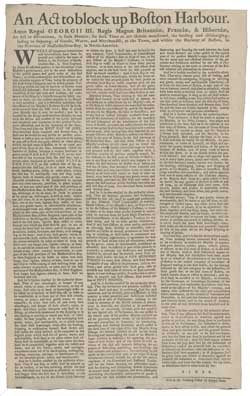Collections Online
An Act to Block up Boston Harbour
To order an image, navigate to the full
display and click "request this image"
on the blue toolbar.
-
Choose an alternate description of this item written for these projects:
- Main description
[ This description is from the project: Coming of the American Revolution ]
The Boston Port Bill passed in Parliament on March 31, 1774, and arrived in Massachusetts, along with General Thomas Gage, in May of that year.
"commotions and insurrections"
On the evening of 16 December 1773 a large crowd gathers at Griffin's Wharf in Boston as "Mohawks" dump 342 chests of tea into Boston Harbor. The East India Company, owner of the doomed tea, expects to be compensated for its loss. Parliament, which had earlier granted the company a monopoly over the sale of tea in the colonies, once again comes to its rescue. Colonists receive news of Britain's response in May 1774, when the Boston Port Bill arrives in Massachusetts along with General Thomas Gage, the newly appointed governor of the colony. Bostonians are shocked by the act's provisions, which take effect on 1 June, but Parliament is confident that this new legislation will compel Bostonians, as well as the other North American colonies, to respect Parliament's authority.
Questions to Consider
1. What are the geographic boundaries of Boston harbor that are closed to trade?
2. What is the consequence if any goods are imported to or exported from Boston harbor?
3. What types of vessels are exempt from this act? Why?
4. Who is authorized to inspect the ships and seize goods?
5. What is the penalty for appointed officials who collude with the colonists to bypass the new law?
6. When can the port of Boston reopen?
Further Exploration
7. Imagine that you are an American colonists living outside of Massachusetts. What is your reaction to the Boston Port Bill? Do you agree with Parliament's decision to close the harbor? Why or why not? Do you agree with the conditions that must be met for the port to reopen? Why or why not?

